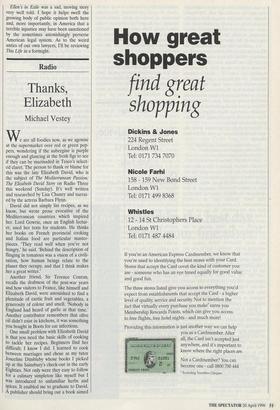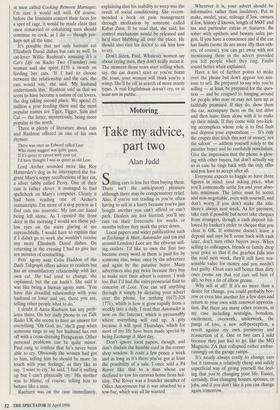Radio
Thanks, Elizabeth
Michael Vestey
We are all foodies now, as we agonise at the supermarket over red or green pep- pers, wondering if the aubergine is purple enough and glancing at the fresh figs to see if they can be marinaded in Tesco's select- ed claret. The person to thank or blame for this was the late Elizabeth David, who is the subject of The Mediterranean Passion: The Elizabeth David Story on Radio Three this weekend (Sunday). It's well written and researched by Lisa Chaney and narrat- ed by the actress Barbara Flynn.
David did not simply list recipes, as we know, but wrote prose evocative of the Mediterranean countries which inspired her. Lord Gowrie, once an English lectur- er, used her texts for students. He thinks her books on French provincial cooking and Italian food are particular master- pieces. 'They read well when you're not hungry,' he said. 'Behind the description of flinging in tomatoes was a vision of a civili- sation, how human beings relate to the planet they occupy, and that I think makes her a great writer.'
Another friend, Sir Terence Conran, recalls the drabness of the post-war years and how visitors to France, like himself and Elizabeth David, were astonished to find a plenitude of exotic fruit and vegetables, a generosity of colour and smell. 'Nobody in England had heard of garlic at that time.' Another contributor remembers that olive oil didn't exist in kitchens, it was something you bought in Boots for ear infections.
One small problem with Elizabeth David is that you need the basic skills of cooking to tackle her recipes. Beginners find her difficult; I know I did. I learned to cook between marriages and chose as my tutor Josceline Dimbleby whose books I picked up at the Sainsbury's check-out in the early Eighties. Not only were they easy to follow for a culinary simpleton like myself but I was introduced to unfamiliar herbs and spices. It enabled me to graduate to David. A publisher should bring out a book aimed at men called Cooking Between Marriages; I'm sure it would sell well. Of course, before the feminists contort their faces for a spot of rage, it would be made clear that once remarried or cohabiting men should continue to cook, as I do — though per- haps not all the time.
It's possible that not only humans eat Elizabeth David dishes but cats as well. In cat-lover Willie Rushton's amusing It's a Cat's Life on Radio Two (Tuesday) one woman said she spent £150 a month on feeding her cats. `If I had to choose between the relationship and the cats, the cats would win,' she said. 'My husband understands this.' Rushton told us that we seem to have become a nation of cat lovers, the dog taking second place. We spend £5 million a year feeding them and the most popular names are Tiger, Tigger, Sam and Cat — the latter, mysteriously, being more popular in the north.
There is plenty of literature about cats and Rushton offered us one of his own rhymes:
There was once an Edward called Lear Who many suggest was quite queer.
If it's queer to cavort with your cat I'd have thought I was as queer as old Lear.
Lord Archer sounded more like Roy Hattersley's dog as he interrupted the fra- grant Mary's soppy recollections of her cat, a silver tabby called Percy. One of their cats is rather clever: it managed to find spellcheck on Mary's computer. Clearly it had been reading one of Archer's manuscripts. I'm more of a dog person as I find cats too neurotic. My last cat hated being left alone. As I opened the front door in the morning I would see those yel- low eyes on the stairs glaring at me reproachfully. I would have to explain that if I didn't go to work she wouldn't receive any more Elizabeth David dishes. On returning in the evening I had to give her ten minutes of counselling.
Pets' agony aunt Celia Haddon of the Daily Telegraph offers advice to readers but has an unsatisfactory relationship with her own cat. She had tried to change, she explained, but the cat hadn't. She said it was like being a human agony aunt. 'You have this dreadful relationship with your husband or lover and yet, there you are, telling other people what to do.'
I doubt if Anna Raeburn has any prob- lems there. On her daily phone-in on Talk Radio UK she seems to have an answer for everything. 'Oh God, no,' she'll gasp when someone rings to say her husband has run off with a cross-dressing Paraguayan. Other personal problems can be quite minor. Paul rang to confess that he's never been able to cry. Obviously the women had got to him, telling him he should be more 'in touch with your feelings', as they like to say. 'I want to cry,' he said, 'I find it welling up but I can't physically cry.' His mother was to blame, of course, telling him to behave like a man.
Raeburn was on the case immediately, explaining that his inability to weep was the result of social conditioning. She recom- mended a book on pain management through meditation by someone called Kabat Zinn. If he read that, she said, his control mechanism would be released and he'd start blubbing all over the place. He should also visit his doctor to ask him how to cry.
Don't listen, Paul. Whatever women say about crying men, they don't really mean it. The moment those tears start rolling when, say, the car doesn't start or you've burnt the toast, your woman will think you're a wimp. She'll be off in search of more manly types. A real Englishman doesn't cry, or at least not in public.



































































 Previous page
Previous page